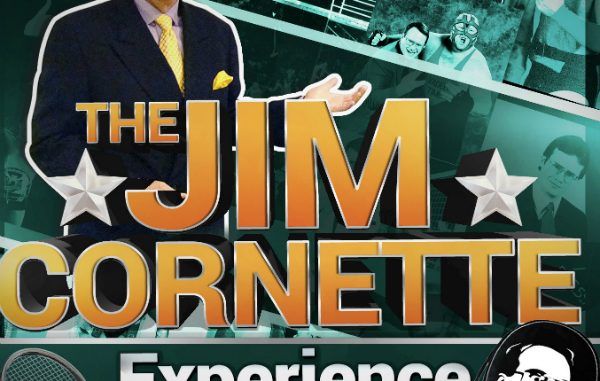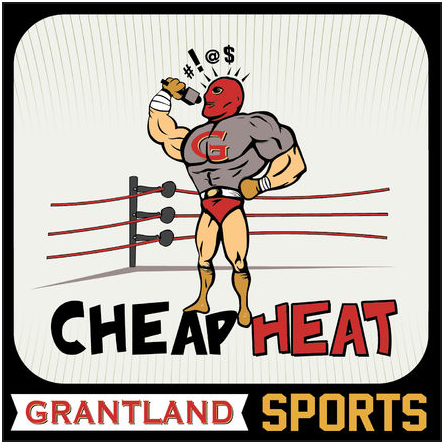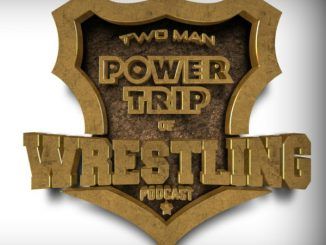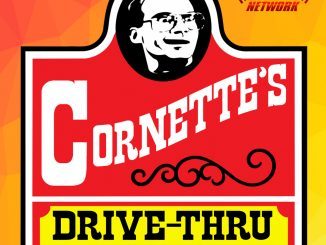
The Jim Cornette Experience Episode – Great American Bash 1989
Release Date: January 18, 2018
Recap By: Mark Charles Adams
DIRECT LINK TO LISTEN/DOWNLOAD
Top Stories/Moments of interest
- The epic conclusion to the death of Jim Crockett Promotions trilogy!
Recap
00:00:00 – Intro: Jim welcomes us to the show and says, continuing the last weeks of looking at the end of Jim Crockett Promotions, this week we’ll discuss The Great American Bash of 1989. Jim describes the ‘89 Bash as the “fiery crash at the bottom of the valley.” He then introduces co-host Brian Last.
00:02:19 – Other podcast/Cornette’s Collectables: They discuss Jim’s appearance on this weeks episode of Kentucky Fried Wrasslin’ and other shows.
00:07:21 – Fire & Fury: Jim and Brian briefly discuss the recent release of book. Jim has received his book, Brian again mentioning how he is reading Devil’s Bargain, which covers the background to Steve Bannon’s background. Jim weirdly talks at length about how he’ll take the book to read at Paul Miller Ford in Lexington, Kentucky.
00:08:33 – 605 Mothership Facebook group watch: Brian talks about a match which was watched in the podcast Facebook group. The match was The Midnight Express versus The Fantastics from Houston after The Last Stampede. Brian asks about how wild the crowd was against Cornette, Jim says it was probably in July and he’d had a little time to rebuild his heat. Jim said about how after some matches he would basically be stripped and either put in a diaper or his mothers dress. Somehow this only added to Jim’s heat because he would come back at the next show in each town pretending nothing had happened.
00:12:04 – The Great American Bash 1989: Jim recaps how last week they talked about the run up to January 1989 with Jim Crockett and how business was falling apart.
Talk turns to when Dusty left as booker, and whether or not he would have stayed on as a star under a different booker in any circumstances. Jim says it was best for him and everyone to go, but he may have stayed on under Bill Watts. Jim also talks about him working for Vince and says he was never a fan of him in WWF with the polka dots. Jim then tells a story of Dusty in the early NXT once saying, in his best Dusty impression “Vince better be glad I didn’t save my money.”
Moving back to booking in JCP, Jim talks about how George Scott bungled the booking, after what Dusty had left in place was abandoned. The Iron Sheik was signed to a $100,000 contract, but Jim says Scott wasn’t aware how far Sheik had fallen since 1978 and after a few weeks of under-performing he was sent home. A year later, forgetting he was under contract, his deal rolled over and they had to pay him another $100,000. They talk about other talent who left in 1989 as the company went under Turner.
Jim talks about how TV even changed under Turner. Syndicated TV was de-emphasized and Jim believes this did damage to selling the live events tickets. He says the TV shows were also full of squash matches and were too polished for some audiences. Jim says the way people were paid changed as well, instead of “balloon payments” they went to being paid equal installments every two weeks. Jim thinks this was the end of the wrestling business as people didn’t have to work for their money and found excuses to not put in work at smaller house shows.
TBS made Clash of Champions to be a free TV alternative to WrestleMania that year, while George Scott was still booker. Scott didn’t feel it was wise to promote the show on TV as they were doing a lot of the same matches on the house show circuit. As such the show only drew a 4.3 in TV ratings and less than 5,000 people in attendance at the Superdome. The Midnights and Jim gave notice because of Scott’s booking, but ultimately Scott was fired before they left. After this came the era of the booking committee, featuring a mix of people who were and weren’t creatively minded. JR asked Jim and The Midnights to stay and they said no, ultimately agreeing to only take 6 weeks off and came back in May. Jim talks about how bad the contract negotiations then became with Jim Herd, saying they might have agreed to take a cut, but were offered an amputation.
Jim covers some bad decisions by the booking committee during the Tag Team Tournament and when asked about some of the choices he answers, “I don’t know, I was not in the meetings…But this is why I was soon asked to be in the meetings!”
Moving to the Great American Bash Tour, Jim quickly recaps how the 1988 tour was the moment that Dusty had rebuilt business and the tour was a success. In July 1989, The Midnight Express were just returning from their hiatus, having to return as babyfaces because they had left that way. Jim then runs through July 1989:
July 1st – Charlotte, NC
House: $37,000 – less than 3,000 to see Sting v s.Terry Funk.
Once drew 25,000 people in 1985 for the original Bash.
July 2nd – Omni, Atlanta
Less than 7,000 people, after drawing around $200,000 in previous years.
July 3rd & 4th – TV Tapings
July 5th – Charleston, SC
$300 Pay off
July 6th– Marietta, Georgia
July 7th– Roanoak, Virgina
$350 pay off
Jim admits at this point it was getting tougher to find out what the houses were as they weren’t being announced, probably due to embarrassment.
July 8th– Boston, Mass.
House: $57, 000 – less than 5,000 people
Jumped after the match, Dr. Death took exception to how everything was going and hit Ron Garvin with a wooden chair from ringside. Bobby Eaton managed to calm everything in the locker room.
July 9th– Day off
Jim notes the Providence, Rhode Island show was cancelled “due to lack of interest” and they all ended up stuck in a hotel as the next days show was near by.
July 10th– Springfield, Mass
House: $11,000 – less than 1,000 people
Jim says this card deserved better, but was a poorly promoted show, in a town they have never run before.
July 11th– Day off
Flight to Chicago was cancelled and they never made the show.
3,000 people attended, but Jim notes TBS had put ticket prices up which didn’t help matters.
July 12th – Carbondale, Illinois
House: $12,000
Jim seems apoplectic they ran the Carbondale college when this tour didn’t go to Greensboro or Raleigh, which were both considered $100, 000 towns.
July 13th – Jackson, Tennessee
House: $11,000 – less than 1,000 people
July 14th– Memphis, Tennessee
House: $25,000 – about 2000 people
Jim notes this looked good by comparison to everything that had gone before it.
July 15th– Richmond, Virginia
House: Not Recorded
Jim says the show must have been down from previous years due to the $400 payoff
July 16th – TV Taping, Fort Worth, Texas
July 17th – Lubbock,Texas
July 18th– TV Taping, Amarillo, Texas
July 19th– Day off
Jim says some folks were filming TV at Centre Stage in Atlanta
July 20th– Day off
Jim believes a show was cancelled
July 21st– Dayton, Ohio
$250 pay off for a show “with no people whatsoever”
July 22nd– Philadelphia, PA
House: $39,000 – less than 3,000 people
Headlined by a 10 man Badstreet match that should have done better, given previous years and a record $160,000 sell out in 1987.
This was the night that Jim jumped off the ring apron and tore his left knee. Jim called his Doctor and was told “not to do anything athletic” until he had been to see him.
July 23rd – Baltimore, Maryland
The Great American Bash Pay Per View
This show was a sell out, which Jim says proved someone still cared.
This night was the Tuxedo match between Jim and Paul E. The match was not played for comedy, Jim decided it should be a fight. Working through his knee injury to get to the ring, there was a plan for Paul to work Jim’s knee with his large phone, but Heyman ultimately went for the good knee by mistake. Jim notes this match is on the WWE Network now and you can see where Jim grabbed Paul and got him to switch knee.
July 24th
Jim is off to see his Doctor
July 25th– Wilmington, NC
Jim is off
July 26th – Jacksonville, Florida
Jim was off, but believes this show was cancelled
July 27th– Tallahassee, Florida
$300 pay off
Jim returned to the crew
July 28th – Orlando, Florida
$300 pay off
July 29th – Tampa, Florida
$300 pay off
July 30th – Miami, Florida
$300 pay off
Jim believes they were giving token $300 pay offs to top guys from these shows. He also notes they received a contract payment $2,500 to make up at the end of the tour.
July 31st – New Orleans, TV Taping
Moving into August, they continued to do TV tapings and poorly attendend shows finishing the tour in Atlanta back at the Omni, ending on something of a mild disappointment, drawing $89,000 for less than 8,000 people for a War Games match.
Jim says somehow the tour, which had been worth millions of dollars some years and turned it into “a bunch of TV tapings and two good houses.” Jim then mentions in passing, that is was around this time, that the WCW Saturday night show was a repeat from 3 weeks before, because they couldn’t find the correct tape.
Jim talks about how he believed this tour was ultimately the thing that lead Ric Flair to demand to be booker for the promotion. Jim says Flair then rebuilt the roster and got the Pay-Per-view and TV ratings back up, but ultimately couldn’t manage the same with house show numbers. But even during this period Jim Herd was always breathing down Flair’s neck, between not liking Herd and setting up SMW, this is why Jim says he never returned to the company when asked in 1991.
Jim talks about how surprised he was that Turner couldn’t make money from the syndicated television, and thought they’d always have big TV and pay-per-view under Turner – noting that ultimately even Turner cancelled them, which is why Bischoff didn’t want to buy the company. But was surprised they bought in people who knew nothing about wrestling to run the company quite quickly. Jim then says, before Bischoff made a go of WCW, there must have been 9 more booking regimes, with more than two a year – describing it as “a f**king mess.” He says they polished it up and made it WWF lite and threw away all the grit and reality of what made the product work.
Brian asks when Jim first saw a make-up person backstage and Jim says there was a hair stylist first. Noting that Terri Runnels ultimately came in as makeup artist. They then joke about how much make-up Paul Heyman would have put on himself in this era.
Talk moves to Flair quitting as booker in March 1990 and how Herd was mad at him. The plan had been to drop the belt to Sting in the summer, but a film crew showed up at a house show in Chicago. When asked why they were there, they announced they were there to film Flair dropping the belt to Luger. Ric Flair promptly refused to do it.
Jim compares the period from 88-90 to the period from 99-01 and says they were the only company to drop so stunningly from a height in the same way twice, eventually folding altogether.
Brian asks what would have happened if Bill Watts had asked for a Smokey Mountain Wrestling invasion in 1993. Jim says he never had a chance, as no one would give him the time to do anything in WCW. He also notes that SMW would have only ever been a developmental territory and the only team he could have offered would be the Heavenly Bodies. Jim says he ultimately did more with talent in WWF.
Returning to talking about the Bash pay-per-view itself, Brian notes it is still praised as a great pay-per-view and asks what the feeling in the locker room was after the show itself. Jim says it was buoyant and happy, they believed they could still turn things around, something that again spurred Flair on to grasp the book.
They briefly discuss Brian Pillman’s chances of being a top guy as Flair was such a fan, but admit it was all just another cautionary tale of not expecting too much, as was the whole era.
02:04:28 – Show wrap up.
Rating: 7/10
Review
Again there is a lot in this one to like, but it jumps around so much it is a very difficult thing to recap – thoughts dead end, stories change midflow into other stories, and sometimes you just plain have no idea who or what event Jim is talking about. Taken as a trilogy of shows, however, they are a very good listen and if you’re interesting in business and the numbers, as well as how things fell apart – you probably won’t find a finer 4-ish hours of content on the matter than Experience 212-215.
Timestamps
“00:00:00 – Intro”
“00:02:19 – Other podcast/Cornette’s Collectables”
“00:07:21 – Fire & Fury”
“00:08:33 – 605 Mothership Facebook groupwatch”
“00:12:04 – The Great American Bash 1989”
“02:04:28 – Show wrap up”
Writer Bio
Mark is an English storyteller, joker, and drunk.
This week he recapture the quickly lost Christmas spirit with a late performance of A Christmas Carol at the Royal Shakespeare Company.




Be the first to comment